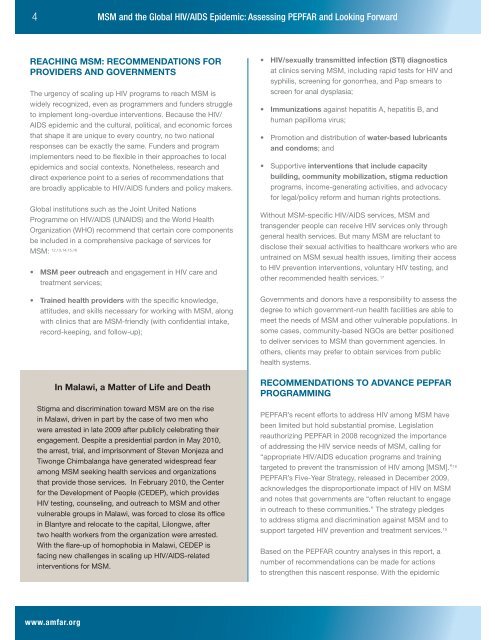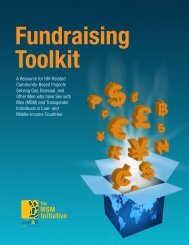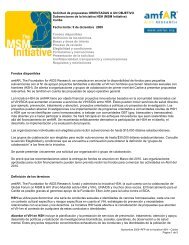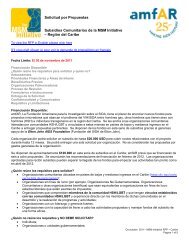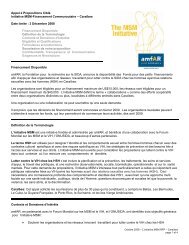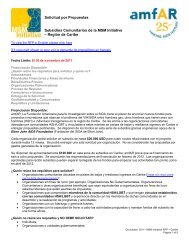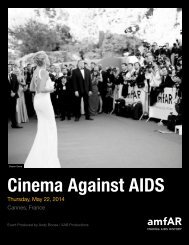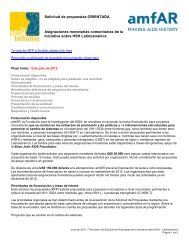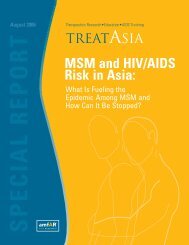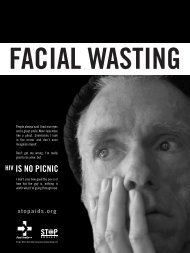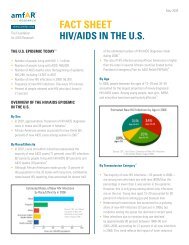Issue Brief: MSM and the Global HIV/AIDS Epidemic - amfAR
Issue Brief: MSM and the Global HIV/AIDS Epidemic - amfAR
Issue Brief: MSM and the Global HIV/AIDS Epidemic - amfAR
You also want an ePaper? Increase the reach of your titles
YUMPU automatically turns print PDFs into web optimized ePapers that Google loves.
4<br />
<strong>MSM</strong> <strong>and</strong> <strong>the</strong> <strong>Global</strong> <strong>HIV</strong>/<strong>AIDS</strong> <strong>Epidemic</strong>: Assessing PEPFAR <strong>and</strong> Looking Forward<br />
REACHING <strong>MSM</strong>: RECOMMENDATIONS FOR<br />
PROVIDERS AND GOVERNMENTS<br />
The urgency of scaling up <strong>HIV</strong> programs to reach <strong>MSM</strong> is<br />
widely recognized, even as programmers <strong>and</strong> funders struggle<br />
to implement long-overdue interventions. Because <strong>the</strong> <strong>HIV</strong>/<br />
<strong>AIDS</strong> epidemic <strong>and</strong> <strong>the</strong> cultural, political, <strong>and</strong> economic forces<br />
that shape it are unique to every country, no two national<br />
responses can be exactly <strong>the</strong> same. Funders <strong>and</strong> program<br />
implementers need to be flexible in <strong>the</strong>ir approaches to local<br />
epidemics <strong>and</strong> social contexts. None<strong>the</strong>less, research <strong>and</strong><br />
direct experience point to a series of recommendations that<br />
are broadly applicable to <strong>HIV</strong>/<strong>AIDS</strong> funders <strong>and</strong> policy makers.<br />
<strong>Global</strong> institutions such as <strong>the</strong> Joint United Nations<br />
Programme on <strong>HIV</strong>/<strong>AIDS</strong> (UN<strong>AIDS</strong>) <strong>and</strong> <strong>the</strong> World Health<br />
Organization (WHO) recommend that certain core components<br />
be included in a comprehensive package of services for<br />
<strong>MSM</strong>: 12,13,14,15,16<br />
• <strong>MSM</strong> peer outreach <strong>and</strong> engagement in <strong>HIV</strong> care <strong>and</strong><br />
treatment services;<br />
• Trained health providers with <strong>the</strong> specific knowledge,<br />
attitudes, <strong>and</strong> skills necessary for working with <strong>MSM</strong>, along<br />
with clinics that are <strong>MSM</strong>-friendly (with confidential intake,<br />
record-keeping, <strong>and</strong> follow-up);<br />
In Malawi, a Matter of Life <strong>and</strong> Death<br />
Stigma <strong>and</strong> discrimination toward <strong>MSM</strong> are on <strong>the</strong> rise<br />
in Malawi, driven in part by <strong>the</strong> case of two men who<br />
were arrested in late 2009 after publicly celebrating <strong>the</strong>ir<br />
engagement. Despite a presidential pardon in May 2010,<br />
<strong>the</strong> arrest, trial, <strong>and</strong> imprisonment of Steven Monjeza <strong>and</strong><br />
Tiwonge Chimbalanga have generated widespread fear<br />
among <strong>MSM</strong> seeking health services <strong>and</strong> organizations<br />
that provide those services. In February 2010, <strong>the</strong> Center<br />
for <strong>the</strong> Development of People (CEDEP), which provides<br />
<strong>HIV</strong> testing, counseling, <strong>and</strong> outreach to <strong>MSM</strong> <strong>and</strong> o<strong>the</strong>r<br />
vulnerable groups in Malawi, was forced to close its office<br />
in Blantyre <strong>and</strong> relocate to <strong>the</strong> capital, Lilongwe, after<br />
two health workers from <strong>the</strong> organization were arrested.<br />
With <strong>the</strong> flare-up of homophobia in Malawi, CEDEP is<br />
facing new challenges in scaling up <strong>HIV</strong>/<strong>AIDS</strong>-related<br />
interventions for <strong>MSM</strong>.<br />
• <strong>HIV</strong>/sexually transmitted infection (STI) diagnostics<br />
at clinics serving <strong>MSM</strong>, including rapid tests for <strong>HIV</strong> <strong>and</strong><br />
syphilis, screening for gonorrhea, <strong>and</strong> Pap smears to<br />
screen for anal dysplasia;<br />
• Immunizations against hepatitis A, hepatitis B, <strong>and</strong><br />
human papilloma virus;<br />
• Promotion <strong>and</strong> distribution of water-based lubricants<br />
<strong>and</strong> condoms; <strong>and</strong><br />
• Supportive interventions that include capacity<br />
building, community mobilization, stigma reduction<br />
programs, income-generating activities, <strong>and</strong> advocacy<br />
for legal/policy reform <strong>and</strong> human rights protections.<br />
Without <strong>MSM</strong>-specific <strong>HIV</strong>/<strong>AIDS</strong> services, <strong>MSM</strong> <strong>and</strong><br />
transgender people can receive <strong>HIV</strong> services only through<br />
general health services. But many <strong>MSM</strong> are reluctant to<br />
disclose <strong>the</strong>ir sexual activities to healthcare workers who are<br />
untrained on <strong>MSM</strong> sexual health issues, limiting <strong>the</strong>ir access<br />
to <strong>HIV</strong> prevention interventions, voluntary <strong>HIV</strong> testing, <strong>and</strong><br />
o<strong>the</strong>r recommended health services. 17<br />
Governments <strong>and</strong> donors have a responsibility to assess <strong>the</strong><br />
degree to which government-run health facilities are able to<br />
meet <strong>the</strong> needs of <strong>MSM</strong> <strong>and</strong> o<strong>the</strong>r vulnerable populations. In<br />
some cases, community-based NGOs are better positioned<br />
to deliver services to <strong>MSM</strong> than government agencies. In<br />
o<strong>the</strong>rs, clients may prefer to obtain services from public<br />
health systems.<br />
RECOMMENDATIONS TO ADVANCE PEPFAR<br />
PROGRAMMING<br />
PEPFAR’s recent efforts to address <strong>HIV</strong> among <strong>MSM</strong> have<br />
been limited but hold substantial promise. Legislation<br />
reauthorizing PEPFAR in 2008 recognized <strong>the</strong> importance<br />
of addressing <strong>the</strong> <strong>HIV</strong> service needs of <strong>MSM</strong>, calling for<br />
“appropriate <strong>HIV</strong>/<strong>AIDS</strong> education programs <strong>and</strong> training<br />
targeted to prevent <strong>the</strong> transmission of <strong>HIV</strong> among [<strong>MSM</strong>].” 18<br />
PEPFAR’s Five-Year Strategy, released in December 2009,<br />
acknowledges <strong>the</strong> disproportionate impact of <strong>HIV</strong> on <strong>MSM</strong><br />
<strong>and</strong> notes that governments are “often reluctant to engage<br />
in outreach to <strong>the</strong>se communities.” The strategy pledges<br />
to address stigma <strong>and</strong> discrimination against <strong>MSM</strong> <strong>and</strong> to<br />
support targeted <strong>HIV</strong> prevention <strong>and</strong> treatment services. 19<br />
Based on <strong>the</strong> PEPFAR country analyses in this report, a<br />
number of recommendations can be made for actions<br />
to streng<strong>the</strong>n this nascent response. With <strong>the</strong> epidemic<br />
www.amfar.org


